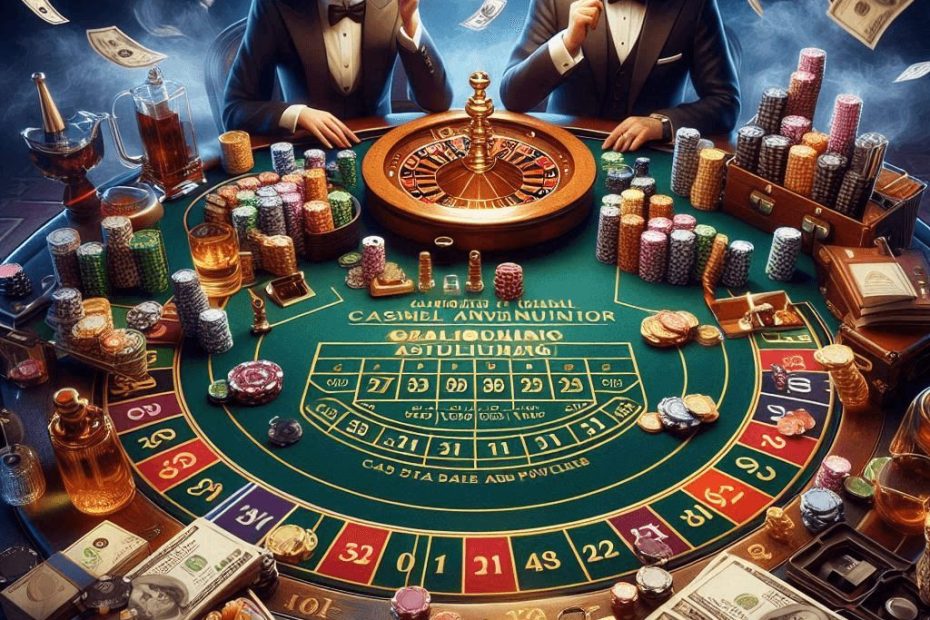In the captivating world of casino gaming, understanding the odds and payouts associated with table games is a crucial aspect of maximizing your gaming experience and informed decision-making. Whether you’re a seasoned player or just starting your casino journey, mastering the intricacies of table game odds and payouts can significantly enhance your chances of success and enjoyment.
In this comprehensive article, we’ll delve into the world of casino table game odds and payouts, exploring the mathematical principles, probability calculations, and strategies that can help you navigate the casino landscape with confidence.
Understanding Probability and Odds
At the heart of casino table games lies the fundamental concept of probability and odds. These mathematical principles govern the likelihood of specific outcomes occurring and the potential rewards associated with them.
Probability Basics
Probability is the measure of the likelihood that an event will occur. In the context of casino table games, probability is used to calculate the chances of a particular outcome, such as the roll of a dice or the deal of a card. Probability is expressed as a value between 0 and 1, where 0 represents an impossible event and 1 represents a certain event.
Odds Calculation
Odds, on the other hand, represent the ratio of the likelihood of an event occurring to the likelihood of it not occurring. In casino table games, odds are often used to express the potential payout for a successful wager. For example, if the odds of a particular outcome are 5:1, it means that for every $1 wagered, the player can expect to receive a $5 payout if the event occurs.
Understanding the relationship between probability and odds is crucial for making informed decisions when playing casino table games. By recognizing the underlying mathematical principles, players can better evaluate the potential risks and rewards associated with their bets.
Exploring Common Table Games
Casino table games encompass a wide range of offerings, each with its own unique set of odds and payouts. Let’s delve into the specifics of some of the most popular table games.
Blackjack
Blackjack is a classic card game that pits the player’s hand against the dealer’s. The objective is to get a hand total as close to 21 without exceeding it. In blackjack, the house edge can be as low as 0.5% when using optimal strategy, making it one of the most favorable table games for players.
Blackjack Odds and Payouts
- The standard payout for a winning blackjack hand is 1:1 (even money).
- The payout for a blackjack (an Ace and a 10-value card) is typically 3:2, or 1.5:1.
- The house edge in blackjack can be minimized by using basic strategy and card counting techniques.
Roulette
Roulette is a game of chance that involves a spinning wheel with numbered slots. Players can place bets on specific numbers, groups of numbers, or various other betting options.
Roulette Odds and Payouts
- The payout for a single number bet is 35:1.
- The payout for a split bet (two adjacent numbers) is 17:1.
- The payout for a street bet (three numbers in a row) is 11:1.
- The house edge in roulette can range from 2.70% (European roulette) to 5.26% (American roulette).
Craps
Craps is a dice-based game where players wager on the outcome of a pair of dice. It offers a wide range of betting options, from simple bets like “Pass” or “Don’t Pass” to more complex proposition bets.
Craps Odds and Payouts
- The payout for a “Pass” or “Don’t Pass” bet is 1:1.
- The payout for a “Come” or “Don’t Come” bet is also 1:1.
- The payout for a “Hard 4” or “Hard 10” bet is 7:1.
- The house edge in craps can range from around 1.4% to over 16%, depending on the specific bet.


Baccarat
Baccarat is a card game where players bet on the outcome of a comparison between the “player” and “banker” hands. It is often associated with high-stakes gambling and offers relatively favorable odds for players.
Baccarat Odds and Payouts
- The payout for a winning “Player” or “Banker” bet is 1:1.
- The payout for a “Tie” bet is typically 8:1 or 9:1.
- The house edge in baccarat can be as low as 1.06% for the “Banker” bet and 1.24% for the “Player” bet.
Poker
Poker is a family of card games that involve betting on the value of a player’s hand. While not strictly a table game, many casinos offer various poker variants, each with its own set of odds and payouts.
Poker Odds and Payouts
- Payouts in poker are determined by the specific game variant and the ranking of the player’s hand.
- The house edge in poker varies greatly depending on the game, the number of players, and the skill level of the participants.
- Experienced poker players can often reduce the house edge through the use of strategic decision-making and skilled play.
Understanding the underlying odds and payouts associated with these common table games is crucial for making informed decisions and maximizing your potential for success.
Strategies for Improving Odds and Payouts
While casino table games inherently favor the house, there are strategies and techniques that players can employ to improve their odds and maximize their payouts.
Mastering Game-Specific Strategies
Each table game has its own unique strategies and optimal play patterns. Investing time in learning and practicing these game-specific strategies can significantly reduce the house edge and increase your chances of winning.
For example, in blackjack, mastering basic strategy and card counting techniques can lower the house edge to under 1%. In roulette, understanding the differences between European and American roulette and focusing on even-money bets can provide a better mathematical edge.
Bankroll Management
Effective bankroll management is crucial in casino table games. Determining an appropriate bet size, setting loss limits, and managing your bankroll strategically can help you avoid quick depletion of your funds and extend your gaming sessions.
Utilizing Bonuses and Promotions
Many casinos offer bonuses, promotions, and loyalty programs that can enhance the overall value of your gaming experience. Taking advantage of these incentives, such as welcome bonuses, free bets, or reload bonuses, can effectively improve your odds and payouts.
Practicing Responsible Gambling
Responsible gambling is essential when playing casino table games. This includes setting personal limits, taking breaks, and maintaining a healthy perspective on the inherent risks involved. Adhering to responsible gambling principles can help you enjoy the thrill of table games without succumbing to the pitfalls of excessive or problematic gambling.
The House Edge and Its Implications
The house edge is a fundamental concept in casino gaming that represents the mathematical advantage the casino has over the player. Understanding the house edge and its impact on your gaming experience is crucial for making informed decisions.
Calculating the House Edge
The house edge is typically expressed as a percentage and represents the expected long-term mathematical advantage the casino has over the player. It is the difference between the true odds of an event occurring and the odds the casino offers on a particular bet.
For example, in roulette, the true odds of a single number bet are 37:1 (assuming a European roulette wheel), but the casino pays out at 35:1, resulting in a house edge of 2.70%.
Implications of the House Edge
The house edge is the casino’s way of ensuring a profitable long-term outcome. While it may seem daunting, the house edge is a fundamental reality of casino gaming and should be factored into your decision-making process.
Understanding the house edge can help you:
- Manage your expectations and avoid misconceptions about “beating the casino.”
- Prioritize table games with lower house edges, such as blackjack and baccarat, to maximize your chances of success.
- Recognize the importance of responsible gambling and setting appropriate betting limits.
Navigating Variance and Volatility
In casino table games, the concepts of variance and volatility play a crucial role in the gaming experience and outcome.
Variance Explained
Variance is a statistical measure that reflects the degree of fluctuation in the outcomes of a game. High-variance games, such as slot machines, can experience significant swings in wins and losses, leading to a more volatile and unpredictable gaming experience.
In contrast, low-variance games, like blackjack, tend to have a more consistent and predictable pattern of outcomes, with smaller but more frequent wins and losses.
Volatility and Its Impact
Volatility is closely related to variance and describes the inherent risk and potential for large payouts in a game. High-volatility games offer the potential for substantial wins but also carry a higher risk of significant losses, while low-volatility games generally have smaller but more frequent payouts.
Understanding the variance and volatility of different table games can help you:
- Align your gaming preferences and risk tolerance with the characteristics of the games.
- Manage your bankroll and betting strategies to accommodate the expected swings in outcomes.
- Maintain a realistic perspective on the short-term fluctuations and focus on the long-term mathematical probabilities.
Conclusion
Mastering the intricacies of casino table game odds and payouts is a crucial step in optimizing your gaming experience and maximizing your chances of success. By understanding the underlying mathematical principles, probability calculations, and strategies associated with each table game, you can make more informed decisions and navigate the casino landscape with confidence.
Remember, while the house edge is an inherent reality in casino gaming, employing effective bankroll management, leveraging bonuses and promotions, and practicing responsible gambling can help you enhance your overall gaming experience. Additionally, familiarizing yourself with the variance and volatility of different table games can assist you in aligning your gaming preferences and risk tolerance with the characteristics of the games.
As you continue your casino journey, embrace the opportunity to explore and experiment with various table games, always keeping the principles of odds, payouts, and responsible gambling in mind. With a solid understanding of these concepts, you’ll be well-equipped to navigate the exciting world of casino table games and potentially unlock more rewarding and fulfilling gaming sessions.
FAQs
-
What is the importance of understanding probability and odds in casino table games?
Understand probability and odds to make informed betting decisions, evaluate risks and rewards, and identify favorable table games and strategies in casino gaming.
-
How do the odds and payouts differ across common casino table games?
Table game odds and payouts vary significantly, with blackjack, roulette, craps, and baccarat offering a range of betting options and house edges to consider for informed decision-making.
-
What strategies can players use to improve their odds and payouts in casino table games?
Master game-specific strategies, manage bankroll effectively, leverage casino bonuses/promotions, and practice responsible gambling to enhance table game experience and improve odds and payouts.
-
How does the house edge impact the overall gaming experience?
Understand the house edge, a casino’s mathematical advantage, to manage expectations, identify favorable games, and practice responsible gambling for a sustainable table game experience.
-
What is the role of variance and volatility in casino table games?
Variance reflects game outcome fluctuations, while volatility describes inherent risk and potential for large payouts. Understanding these concepts can help players align preferences, manage bankroll, and maintain perspective when playing table games.
